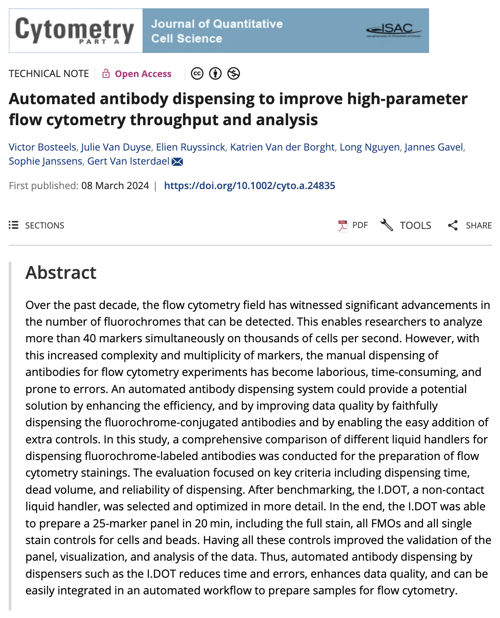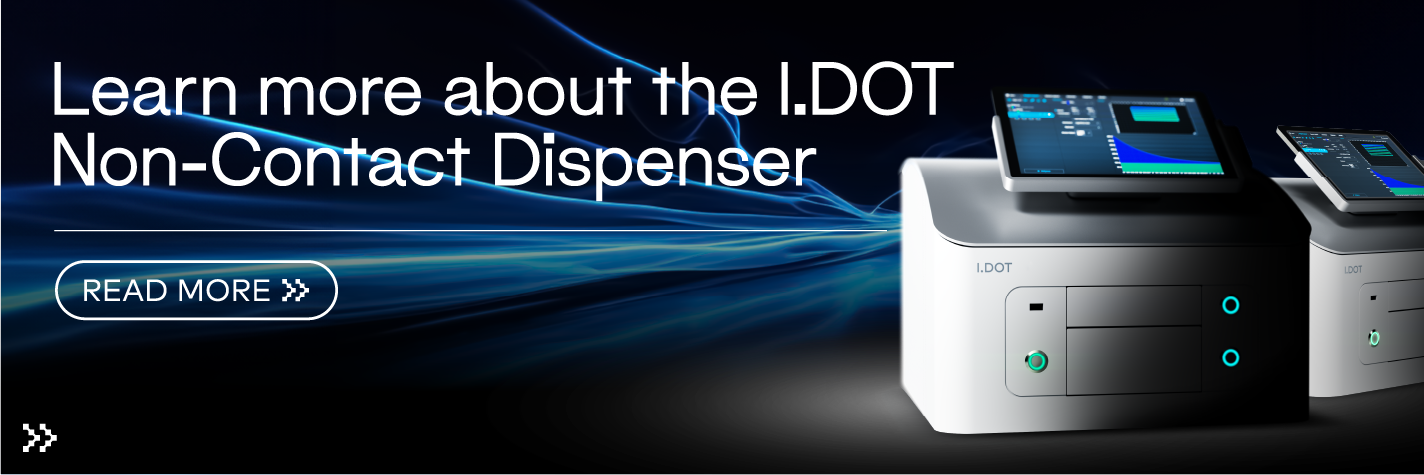Flow cytometry has long been a powerful tool in cell analysis, allowing scientists to delve into the intricate details of cellular processes. However, with the increasing complexity of experiments and the need to analyze multiple parameters simultaneously, a bottleneck has emerged: the manual addition of antibodies. This time-consuming and error-prone process has hindered the efficiency and accuracy of flow cytometry analyses.
To overcome this challenge, researchers at VIB Flow Core Ghent have delved into the realm of automation. By utilizing automated liquid handlers to dispense antibodies, they have significantly improved the throughput and analysis of high-parameter flow cytometry experiments. Their groundbreaking research not only demonstrates the effectiveness of automation in streamlining workflows but also highlights the potential for increased accuracy and reproducibility in cell analysis studies.

Figure 1. Automated antibody dispensing to improve high-parameter flow cytometry throughput and analysis published in Cytometry Part A.
The study explores using automated liquid handlers to dispense the antibodies and recommends that other flow cytometry researchers also use the one that they found to work best.
Comparison of Automated Liquid Handlers for Dispensing Antibodies
The researchers tested various devices, focusing on speed, wasted material, and accuracy. Three automated liquid handlers were evaluated for their suitability in dispensing fluorochrome-labeled antibodies for flow cytometry staining mixes:
- Janus Mini Varispan (Revvity): This system uses a 4-tip dispensing arm for aspirating and dispensing antibodies from various reservoirs.
- Echo 650 (Beckman Coulter): This acoustic dispenser rapidly and accurately dispenses small volumes using sound waves.
- I.DOT (DISPENDIX): This pressure-based non-contact dispenser utilizes an 8-channel head to dispense small volumes precisely from a source plate containing microfluidic pores.
- Cost analysis revealed similar prices for Janus and I.DOT Liquid Handler, while the Echo was nearly double the cost.
Table 1. Summary of the key features compared across the instruments.

Based on these unique benefits, they found the DISPENDIX I.DOT Non-Contact Dispenser to be the preferred solution for antibody dispensing.

This automation benefitted the experiments in three major ways:
- Reduced time: The I.DOT prepared a complex test involving 25 markers in just 20 minutes.
- Improved accuracy: Automation minimizes errors in dispensing the precise antibody amounts.
- Enhanced data quality: Easier addition of control samples allows for better validation of the test results.
This study suggests that automated antibody dispensing can significantly improve flow cytometry workflows.
The recommendation to fellow flow cytometry researchers to adopt automated liquid handlers echoes the sentiment of progress and innovation in the field. By embracing technology to optimize experimental processes, scientists can unlock new possibilities and push the boundaries of what is achievable in cell analysis. This study serves as a beacon of hope for the future of flow cytometry, paving the way for enhanced efficiency and accuracy in cell research. Download the I.DOT brochure today!
Download the full application note here.
References
Bosteels V, Van Duyse J, Ruyssinck E, Van der Borght K, Nguyen L, Gavel J, et al. Automated antibody dispensing to improve high-parameter flow cytometry throughput and analysis. Cytometry. 2024. https://doi.org/10.1002/cyto.a.24835